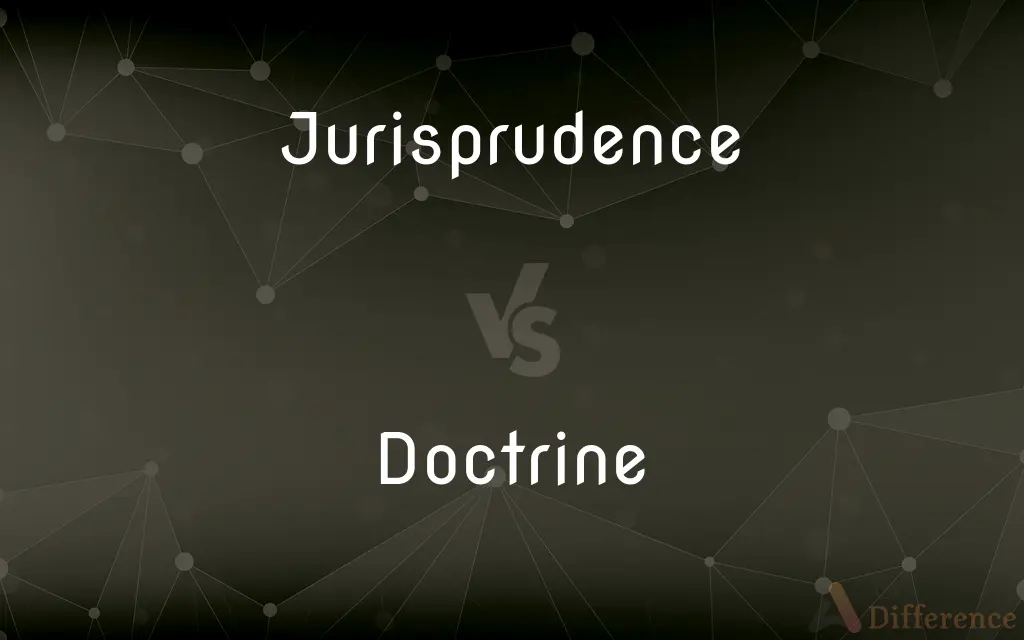Jurisprudence vs. Doctrine — What's the Difference?

Difference Between Jurisprudence and Doctrine
ADVERTISEMENT
Compare with Definitions
Jurisprudence
Jurisprudence, or legal theory, is the theoretical study of law. Scholars of jurisprudence seek to explain the nature of law in its most general form and provide a deeper understanding of legal reasoning and analogy, legal systems, legal institutions, and the role of law in society.Modern jurisprudence began in the 18th century and was focused on the first principles of natural law, civil law, and the law of nations.
Doctrine
Doctrine (from Latin: doctrina, meaning "teaching, instruction") is a codification of beliefs or a body of teachings or instructions, taught principles or positions, as the essence of teachings in a given branch of knowledge or in a belief system. The etymological Greek analogue is "catechism".Often the word doctrine specifically suggests a body of religious principles as promulgated by a church.
Jurisprudence
The philosophy or science of law.
Doctrine
A principle or body of principles presented for acceptance or belief, as by a religious, political, scientific, or philosophic group; dogma.
Jurisprudence
A division, type, or particular body of law
Modern jurisprudence.
Federal jurisprudence.
Bankruptcy jurisprudence.
ADVERTISEMENT
Doctrine
A rule or principle of law, especially when established by precedent.
Jurisprudence
(legal) The theoretical study of law.
Doctrine
A statement of official government policy, especially in foreign affairs and military strategy.
Jurisprudence
(legal) Case law, or the body of case law regarding a certain subject.
Doctrine
(Archaic) Something taught; a teaching.
Jurisprudence
The science of juridical law; the knowledge of the laws, customs, and rights of men in a state or community, necessary for the due administration of justice.
The talents of Abelard were not confined to theology, jurisprudence, philosophy.
Doctrine
(countable) A belief or tenet, especially about philosophical or theological matters.
The incarnation is a basic doctrine of classical Christianity.
The four noble truths summarise the main doctrines of Buddhism.
Jurisprudence
The branch of philosophy concerned with the law and the principles that lead courts to make the decisions they do
Doctrine
The body of teachings of an ideology, most often a religion, or of an ideological or religious leader, organization, group, or text.
What is the understanding of marriage and family in orthodox Marxist doctrine?
Jurisprudence
The collection of rules imposed by authority;
Civilization presupposes respect for the law
The great problem for jurisprudence to allow freedom while enforcing order
Doctrine
(countable) A self-imposed policy governing some aspect of a country's foreign relations, especially regarding what sort of behavior it will or will not tolerate from other countries.
Doctrine
Teaching; instruction.
He taught them many things by parables, and said unto them in his doctrine, Hearken.
Doctrine
That which is taught; what is held, put forth as true, and supported by a teacher, a school, or a sect; a principle or position, or the body of principles, in any branch of knowledge; any tenet or dogma; a principle of faith; as, the doctrine of atoms; the doctrine of chances.
Articles of faith and doctrine.
Unpracticed he to fawn or seek for powerBy doctrines fashioned to the varying hour.
Doctrine
A belief (or system of beliefs) accepted as authoritative by some group or school
Share Your Discovery

Previous Comparison
Advocate vs. Protagonist
Next Comparison
Incubate vs. Intubate















































